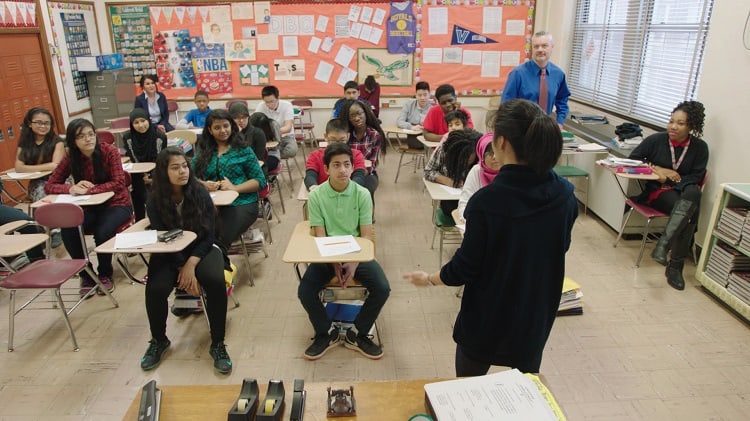
Want to know how brain research could change education? Check out this NOVA documentary
Fixing the U.S. education system has frustrated government representatives, educational professionals and experts for decades. Now scientists have stepped in to help create a better way to teach kids. Their efforts are the focus of the upcoming NOVA documentary School of the Future.
School of the Future explores how the science of learning and technological innovations are transforming the way we teach and learn, and are creating a new vision of the future of education for all children. Narrated by Reading Rainbow host LeVar Burton, the film profiles neuroscientists, psychologists and educators to show how new research on child brain development is key to understanding how to engage and inspire young minds. It also goes inside classrooms to explore how the “science of learning” approach could help narrow the wide achievement gap between suburban and urban schools, as well as schools from high-income and low-income areas.
Before School of the Future officially premieres on PBS stations across the country, the Pittsburgh public broadcasting station WQED and the Remake Learning Council, an education advocacy group, will provide a sneak peek of the film during a special local screening and panel discussion.
Remake Learning Council Director Anne Sekula says the event is meant to spark a conversation on how the film’s examination of “educational innovation and equity” could benefit area schools.
“It’s really looking at the science of learning, and what we know now about human and brain development, and how we learn best,” says Sekula. “But it’s also looking at the examples and models of how that looks in an educational setting.”

One such model the film showcases is the Philadelphia-based Workshop School, where high school kids from some of the city’s toughest neighborhoods learn traditional subjects through hands-on projects focused on real-world problems. In one instance, the school’s science students designed a filtration system meant to solve the water contamination crisis in Flint, Mich.
Sekula explains that project-based learning is preferable to a rigid curriculum based on standardized tests, which determine how much funding schools receive each year and leaves little room for students to fail. She adds that the approach places undue stress on children, and limits their opportunities to experiment, learn from their mistakes and build character.
“It’s a challenge that persists, and we see it more so as a burden on kids who are not achieving that high on standardized tests,” says Sekula. “How are we talking about that? We’re hoping to get some input from the film.”
The event will show clips from the film, followed by a panel discussion led by the film’s producers and local researchers from Carnegie Mellon University’s CREATE Lab, the Pittsburgh Science of Learning Center and University of Pittsburgh’s Center for Urban Education. A Q&A will follow.
The School of the Future sneak peek and panel discussion will take place from 4 p.m. to 6 p.m. on Sept. 13 at WQED Multimedia at 4802 Fifth Ave. in Oakland. Guests must register at Eventbrite.
School of the Future will officially premiere at 9 p.m. Sept. 14 at 9 p.m. as part of SPOTLIGHT EDUCATION, a week of primetime PBS programming examining the challenges facing today’s students and America’s education system.
See a trailer for the film courtesy of NOVA PBS below: